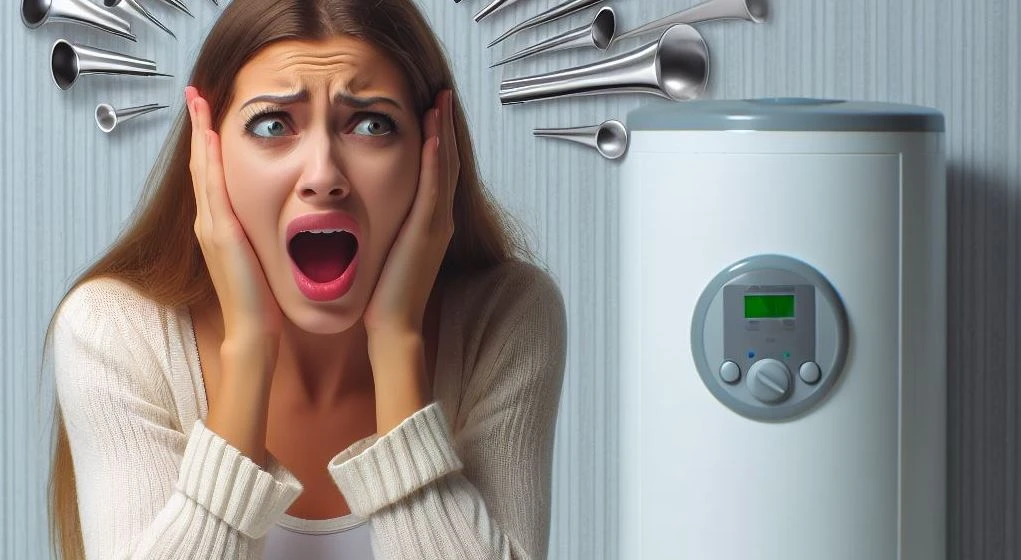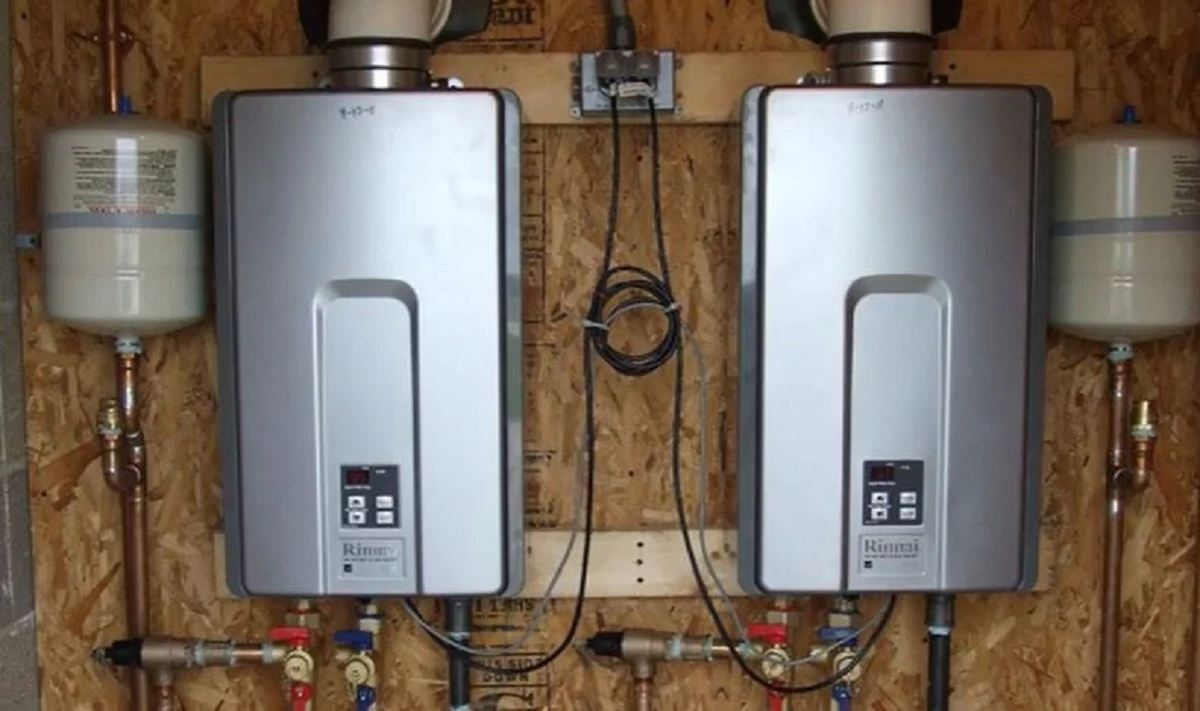Hot Water Heater Making Noise: Causes, Solutions and Prevention
When your hot water heater starts making noise, it’s often a sign that it requires some maintenance or repair. These sounds can vary and have different meanings, ranging from benign to potentially serious issues.
One common noise is a popping or rumbling sound, typically indicating sediment buildup in the tank. Over time, minerals like calcium and magnesium from hard water settle at the bottom of the tank, forming a layer of sediment. This sediment traps water underneath, which boils and creates popping or rumbling noises. Flushing the tank regularly can help prevent this buildup.
Another sound is a high-pitched whistling or tea kettle noise. This usually points to high pressure inside the tank, often caused by thermal expansion or a malfunctioning pressure relief valve. It’s crucial to address this issue to prevent potential safety risks.
Sizzling, hissing, or crackling noises are more common in electric water heaters and often result from sediment interacting with the heating elements. This can reduce the efficiency and lifespan of the heater.
Water dripping or a running water sound may indicate a leak. This could be due to condensation or, more seriously, a leak in the tank itself. If the noise persists, it’s wise to inspect for leaks to avoid water damage or the need for a heater replacement.
If you hear a humming or vibrating noise, it’s typically less concerning. These sounds can occur due to the flow of water or the expansion and contraction of metal parts.
However, if they become louder or more frequent, it could signal loose components that need to be tightened.

Water Heater Making Noise: Causes and Solutions
Hot water heaters are complex systems, and different noises can indicate various issues, each requiring a specific approach to resolve.
1. Hot Water Heater Sounds Like Rocks
This sound usually indicates the presence of large sediment chunks within the tank. Over time, water minerals like calcium and magnesium accumulate and solidify at the bottom, creating rock-like formations. These sediments can disrupt the normal heating process, leading to the noise.
To fix this, the tank needs to be drained and flushed to remove these sediment deposits. This process involves shutting off the water supply and power to the heater, attaching a hose to the drain valve, and letting the water flow out until it’s clear.
2. Hot Water Heater Making Knocking Noise
Knocking sounds often result from the expansion and contraction of metal parts inside the heater due to temperature changes. This is particularly common in heaters with large tanks.
To address this, check and adjust the thermostat setting to prevent overheating. Ensuring that the heating elements are securely fastened can also reduce this noise.
If the issue persists, it might be due to a more severe problem like a damaged tank, which may require professional inspection.
3. Hot Water Heater Sounds Like a Tea Kettle
This whistling noise typically signals a buildup of pressure inside the tank. It’s often caused by a malfunctioning temperature and pressure relief valve or an overly high thermostat setting.
To resolve this, first, lower the temperature setting. If the problem continues, inspect the pressure relief valve; it might need cleaning or replacement. Regular safety valve checks are essential to prevent this issue.
4. Hot Water Heater Making Popping Noise
Popping noises are usually caused by sediment buildup at the tank’s bottom. As water heats, the sediment traps steam bubbles, which burst and create popping sounds.
The solution involves flushing the tank to remove the sediment. For persistent problems, installing a water softener can help minimize mineral buildup in areas with hard water.
5. Hot Water Heater Dripping Noise
A dripping sound can indicate a leak in the tank or the associated plumbing. Inspect the tank, valves, and connecting pipes for any signs of leakage.
Sometimes, the issue might be with the pressure relief valve releasing excess water. If a leak is found, it often requires patching or, in severe cases, replacing the tank.
6. Hot Water Heater Making Noise Like Running Water
This sound can occur when water flows into an empty or partially empty tank. It’s normal during the refilling process after hot water usage.
However, continuous running water sounds could mean a leak or a faulty valve allowing water to flow continuously. Inspecting and repairing the inlet valves and checking for leaks are necessary steps to remedy this issue.
7. Water Heater Making Vibrating Noise
Vibration in water heaters is commonly due to loose pipes or components. Ensure that all external and internal connections are tight.
Sometimes, the vibration can be due to the flow of water through a partially closed valve or pipe; ensuring all valves are fully open can resolve this issue.
8. Water Heater Making Humming Noise
Humming, especially in electric water heaters, can be due to the vibration of the heating elements.
Tightening the elements can typically fix this. If the noise persists, it may indicate an electrical issue, requiring a professional’s attention.
9. Water Heater Sounds Like a Jet Engine
This loud, intense noise often points to a significant buildup of sediment, creating a barrier that water forcefully passes through.
Flushing the tank is the primary solution. In cases where flushing doesn’t resolve the issue, consulting a professional is recommended, as it might indicate a more severe problem with the tank or its components.
Read More: 7 Steps to Draining a Hot Water Heater
Does Water Heater Make Noise During Heating?
It’s not unusual for a water heater to produce sounds while it heats water. These noises can vary from gentle humming to more noticeable sounds like popping or cracking. The humming is typically caused by the flow of electricity in electric models or the burning of gas in gas models.
Popping or cracking noises usually indicate the presence of sediment in the tank, which becomes agitated as the water heats. While these sounds are common, they should be monitored.
In electric heaters, ensuring that the heating elements are secure and functioning correctly can minimize sound. Gas models may require checking the burner and ensuring it’s clean and unobstructed.
It’s important to recognize that while some noise during heating is normal, sudden changes in the type or volume of the noise warrant a closer inspection.
Learn More: Tankless Water Heater Problems
Is Noise from Water Heater Normal?
Noise from a water heater is often normal, especially during the heating cycle. These sounds can range from a low humming to occasional popping or cracking. The humming is generally harmless, often resulting from the vibration of electric heating elements or the flow of gas in gas models.
Popping or cracking noises are typically caused by the interaction of hot water with sediment buildup at the bottom of the tank. While these noises are common, they should be monitored. Regular maintenance, such as flushing the tank, can help minimize sediment buildup and the associated noises.
It’s essential to differentiate between these routine sounds and unusual noises like loud bangs or persistent high-pitched whistles, which could indicate more serious issues.
Risks of a Noisy Water Heater
While many noises from a water heater are normal, certain sounds can indicate potentially dangerous conditions. Loud banging or rumbling noises can suggest a severe sediment buildup, leading to overheating and tank damage.
High-pitched whistling or screeching might signal excessive pressure buildup inside the tank, posing a risk of leaks or even explosions if not addressed. It’s critical to take these sounds seriously and investigate their causes.
Regular maintenance, including flushing the tank and checking the pressure relief valve, can prevent many of these issues. For electric heaters, ensuring the heating elements are functioning correctly is vital.
If unusual or loud noises persist, it’s recommended to seek professional help. Ignoring these warning signs can lead to reduced efficiency, increased energy costs, and in severe cases, catastrophic failure of the heater.
Water Heater Noise When Off
If a water heater makes noise even when it’s not actively heating water, it could be due to several reasons. One possibility is thermal expansion, where the metal parts of the heater contract as they cool down, causing ticking or creaking sounds. These noises are generally harmless.
Another cause could be a leak or drip inside or near the tank, which can create a dripping or trickling sound. Checking for any visible leaks or signs of moisture can help identify this issue.
In electric water heaters, a low humming noise when off might be due to electrical issues or a residual current in the heating elements.
If the noise is a persistent drip or significant humming, it’s advisable to investigate further, as these could be signs of a leak or electrical problem that may need professional attention.
Electric Water Heater Noise
Electric water heaters commonly produce a low humming noise, which is usually normal and results from the vibration of the heating elements as electricity flows through them. However, louder noises like popping, hissing, or crackling can indicate issues like sediment buildup, scale on the heating elements, or malfunctioning elements.
Regularly flushing the tank can help reduce sediment-related noises. If the noise is related to the heating elements, they may need to be cleaned or replaced. In some cases, a high-pitched whine from an electric water heater could indicate an electrical issue, such as a loose wire or a problem with the thermostat.
It’s essential to monitor these sounds and take action if they become louder or change in character. For any persistent or concerning noises, consulting a professional is recommended to ensure the safe and efficient operation of the electric water heater.
Hot Water Heater Making Noise: Preventive Action
Regular Maintenance and Inspection
Routine maintenance is key in preventing noise issues in hot water heaters. This includes annual inspections and flushing of the tank to remove sediment build-up, checking and tightening any loose elements, and ensuring the pressure relief valve functions properly. Regular checks can identify potential issues before they escalate into noise problems.
Adjusting Temperature Settings
Setting the temperature too high can cause excessive boiling and popping noises due to the overheating of water. Adjusting the water heater to an appropriate temperature (around 120-130°F) helps in reducing stress on the heater, thereby minimizing the chances of noise.
Installing a Water Softener
In areas with hard water, installing a water softener can significantly reduce sediment build-up, a common cause of noise in hot water heaters. This helps in prolonging the life of the heater and reducing the need for frequent maintenance.
Inspecting for Leaks and Drips
Regularly checking for any leaks or drips in and around the water heater can prevent issues that lead to noise. Identifying and fixing leaks early can also save on water and energy costs.
Common Questions About Hot Water Heater Noise
Why Does My Hot Water Heater Gurgle?
Gurgling noises in a hot water heater are often due to water flowing through sediment at the bottom of the tank. Flushing the tank to remove this sediment can resolve the issue.
Can Lime Buildup in My Water Heater Cause Noise?
Yes, lime buildup in the water heater can cause popping or crackling noises as the water gets trapped beneath the sediment layer and boils. Regular flushing and using a water softener can reduce lime buildup.
Should I Be Concerned About Hissing Noises from My Water Heater?
Hissing noises can indicate a leak or pressure buildup inside the tank. It’s important to inspect the heater and its valves and consult a professional if necessary.
What Causes a Whining Noise in an Electric Hot Water Heater?
A whining noise in electric hot water heaters is often due to scale build-up on the heating elements. Cleaning or replacing the elements can eliminate this noise.
Discover New Articles: See Our Latest Updates
